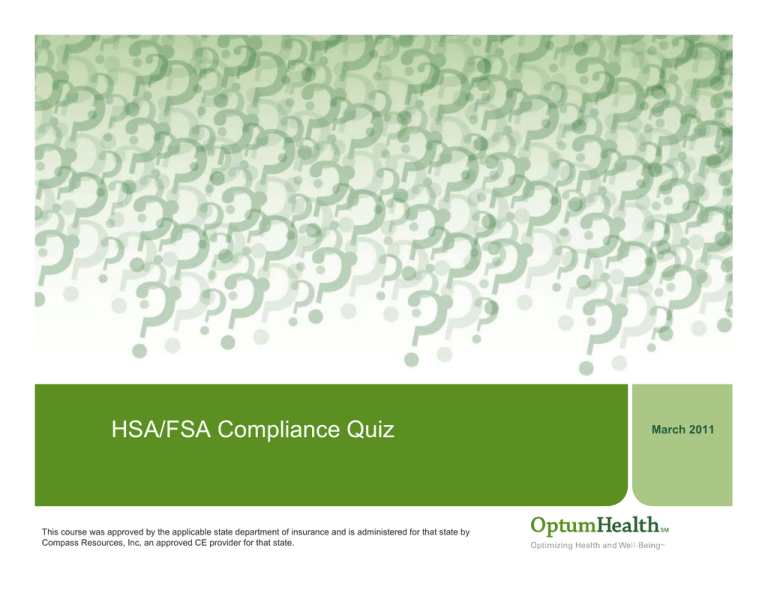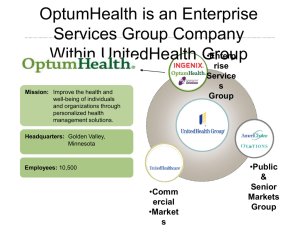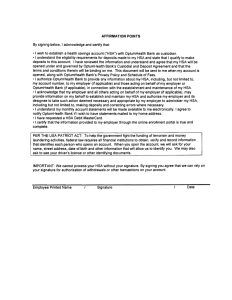
HSA/FSA Compliance Quiz
This course was approved by the applicable state department of insurance and is administered for that state by
Compass Resources, Inc, an approved CE provider for that state.
March 2011
Q:
Disclaimer:
The information contained in this presentation is not intended as legal or tax
advice. It is supplied with the understanding that OptumHealth Financial
Services does not provide legal or tax advice.
Please contact a competent legal or tax professional for personal advice on
eligibility, tax treatment and restrictions. Federal and state laws and regulations
are subject to change.
Confidential property of OptumHealth. Do not distribute or reproduce without express permission from OptumHealth.
1
Health Care FSAs and
Dependent Care FSAs
Can I transfer money from my health care FSA
to my dependent care FSA or vice versa?
A
Yes, when money is low in one account roll the money over
B
Yes, submit a claim to the administrator
C
these are
No, these
are two
twoseparate
separateaccounts
accounts
Answer:
The health and dependent care spending accounts are two separate
C benefit plans. Per IRS regulations, you cannot transfer money between
the two accounts.
Confidential property of OptumHealth. Do not distribute or reproduce without express permission from OptumHealth.
3
I am a divorced parent. May I establish a dependent care
FSA for child care expenses even if my ex-spouse has
already done so?
A
No, because the ex-spouse already has one
B
No, because you need to share the FSA account
C
youare
arethe
thecustodial
custodial
parent
Yes, ifif you
parent
Answer:
Yes, if you are the custodial parent. This is true even if the non-custodial
C parent claims the dependency exemption for that child. In general, the
custodial parent is the parent who has custody for the greater portion of
the calendar year. The non-custodial parent may not participate in a
dependent care FSA because the IRS takes the position that dependent
care expenses are not necessary for the non-custodial parent to be
gainfully employed.
Confidential property of OptumHealth. Do not distribute or reproduce without express permission from OptumHealth.
4
Can I use my Dependent Care FSA to pay for adult day
care for my mother who is not able to care for herself?
A
Yes
B
Yes, ifif the
themother
motherlives
lives
with
with
thethe
employee
employee
at least
at least
halfhalf
the year
the
yearisand
and
a tax
is dependent.
a tax dependent.
C
No, adult day care can not be paid for with an FSA.
Answer:
The mother’s adult day care may be paid for with a dependent care FSA
B if she is a tax dependent of the employee and lives with the employee for
at least half the year.
Confidential property of OptumHealth. Do not distribute or reproduce without express permission from OptumHealth.
5
Under the new legislation what is the maximum amount I
can contribute to the health care FSA and dependent care
FSA?
A
$5,000 and $5,000
B
$2,500 and $2,500
C
$5,000 and $2,500
D
$2,500 and
and $5,000
$5,000
Answer:
Starting Jan. 1, 2013, health care FSA contributions will be limited to a
D maximum of $2,500. The limit will be adjusted according to the consumer
price index (CPI) starting in 2014.This does not affect FSA contribution
limits in 2011. The limit for dependent care FSAs remains unchanged at
$5,000.
Confidential property of OptumHealth. Do not distribute or reproduce without express permission from OptumHealth.
6
Can the officer of a C-Corp participate in an FSA?
A
Yes
Yes
B
No, the officer is a highly compensated employee therefore
they can’t participate
C
Any employee may participate, (subject to the employerdesigned exclusions)
Answer:
A
An officer may participate, (subject to the employer-designed
exclusions), but participation may be limited in order to pass the nondiscrimination tests.
Confidential property of OptumHealth. Do not distribute or reproduce without express permission from OptumHealth.
7
Can I be reimbursed for medical, vision or dental expenses
I incurred while vacationing in Europe?
A
No, because the expenses did not incur in the US
B
No, because my insurance does not cover
international expenses
C
Yes, provided
providedthey
theywere
werequalified
qualified
expenses
expenses
Answer:
As long as the expenses were qualified medical, vision or dental
C expenses, and the participant has the needed information to substantiate
the expenses, where the expenses were incurred does not matter.
Confidential property of OptumHealth. Do not distribute or reproduce without express permission from OptumHealth.
8
HSA Contributions
Sally started a new job on June 1, 2010. She selected a
HDHP together with an HSA. How much can she contribute
to the HSA in 2010?
A
A prorated
proratedamount
amount
B
The full
fullindividual
individual
contribution
contribution
amount
amount
C
No money until next year
D
None of the above
Answer:
A prorated amount, in this case 7/12 of the annual amount, provided she
A is covered by a HDHP the remainder of the year
B
The full individual contribution amount provided she remains covered
by a HDHP for the entire testing period
(December 1, 2010 – December 31, 2011)
Confidential property of OptumHealth. Do not distribute or reproduce without express permission from OptumHealth.
10
When an Employer adds an HSA eligible HDHP on
7-1-2010, (in the middle of the calendar year FSA plan)
when can the employees open and fund their HSAs?
A
July 1, 2010
B
January 1, 2011
C
Whenever the employees want
D
None of the above
Answer:
A
A is correct provided the employee
1) enrolls in the HDHP (and is not covered by a spouses non-HDHP)
2) is not enrolled in the FSA
3) Is not entitled to Medicare and
4) Is not claimed as another person’s tax dependent
Confidential property of OptumHealth. Do not distribute or reproduce without express permission from OptumHealth.
11
Can another person who is over 65 contribute to the HSA
of an individual under 65?
A
No
B
Yes
Answer:
Yes, as long as the contribution is made into an account of an
B eligible individual
Confidential property of OptumHealth. Do not distribute or reproduce without express permission from OptumHealth.
12
How much can I contribute in 2010 to my HSA if I get
divorced in April 2010?
A
$3,050
B
$6,150
C
4/12ths
4/12ths of
of$6,150
$6,150++8/12ths
8/12thsofof$3,050
$3,050
Answer:
It depends whether you were contributing as an individual or family and
whether you changed the coverage as a result of the divorce
A
If you have single coverage there would be no impact on your contributions.
B
If you have family coverage and your children are covered, however your
spouse is no longer covered, you can still contribute to the family maximum
of $6,150
C
If you had family coverage, but changed the coverage to individual and removed
your spouse and children from the plan.
Confidential property of OptumHealth. Do not distribute or reproduce without express permission from OptumHealth.
13
When an employee covers their Domestic Partner on their
HSA HDHP, what is the maximum contribution for 2010 in
their HSA Account(s)?
A
$3,050 each in separate accounts
B
$6,150 in one account
C
$6,150 each
each in
in separate
separateaccounts
accounts
D
Domestic partner is not eligible to open and fund the HSA
E
Employee can only fund to $3,050
Answer:
C
Each can open and contribute the maximum of $6,150 to their
HSAs. Domestic partners are not required to split the contributions like
married couples.
Confidential property of OptumHealth. Do not distribute or reproduce without express permission from OptumHealth.
14
I’m 57 and my spouse just turned 55. I have family
coverage with an HSA. Can I make a catch up contribution
for my spouse into my HSA?
A
Yes
B
No
Answer:
No. In order to make a catch up contribution, the spouse must open
B their own HSA.
Keep in mind that the maximum family contribution would still be $6,150
+ the two $1,000 catch up contributions. A married couple can still have
separate HSAs, but can only contribute up to the maximum family
amount. They can decide how to divide the contributions between the
two accounts.
Confidential property of OptumHealth. Do not distribute or reproduce without express permission from OptumHealth.
15
HSA Distributions
Sally contributed the maximum contribution amount in
2010 to her HSA. In July 2011, she gets an offer she can’t
refuse and leaves the company. Her new company has a
traditional PPO plan. What happens to Sally’s HSA?
A
She can not contribute more money to her HSA
B
She can continue to use her HSA money for
qualified expenses
C
She will have to include excess contributions if she relied on
the “last-month rule” in making a full year contribution in 2010.
D
All of
All
ofthe
theabove
above
Answer:
D
All of the above
Confidential property of OptumHealth. Do not distribute or reproduce without express permission from OptumHealth.
17
What happens if I withdraw money from my HSA to pay a
medical bill, but then later I am reimbursed by my
insurance company for that medical expense?
A
There is nothing you can do
B
Use the money to buy a TV
C
Use the money to take a trip to Cabo, Mexico
D
Repay the
Repay
the mistaken
mistakendistribution
distribution
within
within
a specific
specifictimeframe
timeframe
Answer:
That is what is referred to as an “mistaken distribution". The account
D holder can repay the mistaken distribution by April 15 of the year following
in which year the account holder knew or should have known that it was a
mistake. The repayment is classified as an "adjusted entry", not a
contribution; therefore, it would not count "twice" toward the yearly
maximum. The account holder is responsible to notify the administrator
that the repayment is a distribution correction.
Confidential property of OptumHealth. Do not distribute or reproduce without express permission from OptumHealth.
18
Can I pay for my health insurance premiums from
my HSA?
A
Yes, if you are collecting Federal or State
unemployment benefits
B
Yes, if you have COBRA continuation coverage
C
No, only qualified medical expenses
D
A and
and BB
Answer:
Health insurance premiums that are qualified medical expenses include
D premiums paid for health plan coverage while you are collecting Federal
or State unemployment benefits, or for COBRA continuation coverage
through a former employer.
Confidential property of OptumHealth. Do not distribute or reproduce without express permission from OptumHealth.
19
Can I use my HSA dollars to pay for my 25-year-old
daughter’s out-of-pocket doctor visit?
A
Yes
B
No
Answer:
Yes, if she is your tax dependent.
A
B
No, if she is not your tax dependent. If she is not your tax dependent then
you can’t pay for her medical expenses from your HSA.
Confidential property of OptumHealth. Do not distribute or reproduce without express permission from OptumHealth.
20
HSA Eligibility and Spouse Coverage
Am I eligible for an HSA if I have an HSA-eligible plan as
my primary coverage but am also covered by my spouse’s
employer-provided (non-HSA) plan?
A
No
B
Yes
Answer:
You can only contribute to an HSA only when you have an HSA-qualified
A plan and have no other impermissible coverage. If you are also
covered by a spouse’s non-HSA plan, then you are no longer eligible to
contribute to your HSA. However, you can still use the money in a
previously established HSA to pay for qualified medical expenses, or you
can let the HSA continue to grow on a tax-deferred basis.
Confidential property of OptumHealth. Do not distribute or reproduce without express permission from OptumHealth.
22
State Taxes
HSA Earnings & Contributions
Which states tax HSA earnings?
A
All states
B
No states
C
Alabama, California, New Jersey, Wisconsin
D
New Hampshire,
Hampshire,Tennessee
Tennessee
Answer:
New Hampshire, Tennessee. While health savings accounts were
D created by the federal government, states can choose to follow the federal
tax treatment guidelines or establish their own.
Confidential property of OptumHealth. Do not distribute or reproduce without express permission from OptumHealth.
24
Which states tax eligible HSA contributions?
A
All states
B
No states
C
Alabama, California,
Alabama,
California,New
NewJersey
Jersey, Wisconsin
D
New Hampshire, Tennessee
Answer:
Alabama, California, New Jersey While health savings accounts were
C created by the federal government, states can choose to follow the federal
tax treatment guidelines or establish their own. In January 2011,
Wisconsin became the latest state to apply the same income tax treatment
to health savings account contributions and withdrawals as the federal
government.
Confidential property of OptumHealth. Do not distribute or reproduce without express permission from OptumHealth.
25
Thank you for attending the
HSA/FSA Compliance Quiz Workshop!
Confidential property of OptumHealth. Do not distribute or reproduce without express permission from OptumHealth.
26
Q:
Disclaimer:
The information contained in this presentation is not intended as legal or tax
advice. It is supplied with the understanding that OptumHealth Financial
Services does not provide legal or tax advice.
Please contact a competent legal or tax professional for personal advice on
eligibility, tax treatment and restrictions. Federal and state laws and regulations
are subject to change.
Confidential property of OptumHealth. Do not distribute or reproduce without express permission from OptumHealth.
27
Thank you for attending today’s HSA/FSA Compliance Quiz Workshop!
For more information about OptumHelath Financial Services’ solutions from OptumHealth,
contact your OptumHealth sales executive or visit www.optumhealth.com
OptumHealth | Optimizing Health and Well-Being | www.optumhealth.com
© 2011 OptumHealth, Inc All Rights Reserved.
March 2011
Confidential property of OptumHealth. Do not distribute or reproduce without express permission from OptumHealth.
29



